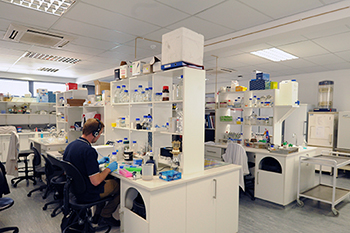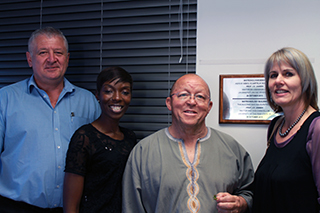Latest News Archive
Please select Category, Year, and then Month to display items
12 January 2024
|
Story Nonsindiswe Qwabe
|
Photo Sonia Small
 Since joining the UFS in 2008, Dr Grey Magaiza has worked extensively on approaches that can foster the socio-economic transformation of societies.
Since joining the UFS in 2008, Dr Grey Magaiza has worked extensively on approaches that can foster the socio-economic transformation of societies.
“The future should be one where communities can decide on their development agenda and futures. That’s the most important for me.” Dr Grey Magaiza, Deputy Director of the Centre for Gender and Africa Studies (CGAS) and Head of the Community Development programme on the Qwaqwa Campus, is passionate about capacitating communities to be agents of change and advancement. His vision for the future emphasises the empowerment of communities to take charge of their development by actively participating in decision making and the implementation of development projects that can improve their lives.
Since joining the UFS in 2008, Dr Magaiza has worked extensively on approaches that can foster the socio-economic transformation of societies. Over the years, he has crafted his research speciality into one that he is most proud of – being an interdisciplinary scientist immersed in the development of communities.
“I’m in a fortunate position of researching what I like. I say ‘fortunate’, because I’ve taken the time to understand what I’m passionate about, which is the overall field of rural livelihoods and livelihood futures – in short, community development. My research starts from an engaged university, understanding the elements that a university must use to enhance transformation and relevance to its immediate community in terms of development.”
One of the ways he has done this is by looking at social entrepreneurship as a development approach for young people in a rural setting. Through workshops with non-profit and civic organisations in Qwaqwa, Dr Magaiza has been helping these organisations to map out their needs and actively meet them through the involvement and support of external role players.
“We understand that communities are part of the national development agenda, but even that national agenda respects community knowledge and intentions and allows communities to shape their identity. A critical enabler of this is community organising. You bring back the capacity in communities to have dialogues on issues affecting them as spaces for engagement, knowledge exchange, and for people to just talk about their way forward.”
By enabling communities to define their development agenda, they can address their specific needs, challenges, and aspirations, he said. “When I look at livelihood futures, it’s quite an exciting aspect of my work – it’s like looking into a fortune tellers’ globe, because you’re not deciding for communities what they should do, but the communities themselves take those decisions.”
UFS launches expansions to Biotechnology Building
2015-11-04
 Biotechnology Building
Photo: Leonie Bolleurs |
To support the strategic focus of the University of the Free State (UFS) on teaching and learning in the field of Biotechnology, the Department of Microbial, Biochemical, and Food Biotechnology introduced upgrades and additions to the value of R23 million to the existing Biotechnology Building on its Bloemfontein Campus. The funding was provided by the Department of Higher Education and Training.
The new section, together with renovations to the existing part of the Biotechnology Building, was opened on Thursday 29 October 2015.
The Department, consisting of three disciplines - Microbiology, Biochemistry, and Food Biotechnology - is extremely diverse. Two of the three disciplines – Microbiology and Biochemistry – are housed in the Biotechnology Building.
Additions and renovations to the Biotechnology Building include:
- Four new research laboratories
- Nine revamped research laboratories
 At the launch of the Biotechnology Building were,
from the left: Nico Janse van Rensburg,
Senior Director: University Estates;
Maureen Khati, University Estates,
Prof Nicky Morgan, Vice Rector: Operations
and Ria Deysel, Director: Facilities Management.
Photo: Leonie Bolleurs
|
The work to the building will have dramatic effects on the quality, as well as the quantity, of postgraduate students. Given the national priority to deliver students, this is very important, particularly at the doctorate level.
Prof Koos Albertyn from the Department said these were the first renovations and expansions done to the building since 1 January 1990. “We welcome the extra space. Forty-six more postgraduate students can now be accommodated in the department,” he said.
Construction took place on the south-western corner of the existing building. Further developments to the building include:
- Six new offices
- A lecture hall for 70 students
- Laboratories that can accommodate 56 postgraduate students
Prof Martie Smit, Academic Head of the Department, said: “This new and refurbished facility enables us to give our best. As academics, we are committed to doing our part in delivering high-quality education at both undergraduate and postgraduate levels to students envisaging a future in biotechnology.”
The James Charles du Preez Seminar Room was also opened at the event. The seminar room is dedicated to Prof Du Preez – who was Head of the Department from October 2002 until the end of 2014. He played a major role in raising funds for upgrading the Biotechnology Building, including the addition of a new wing.